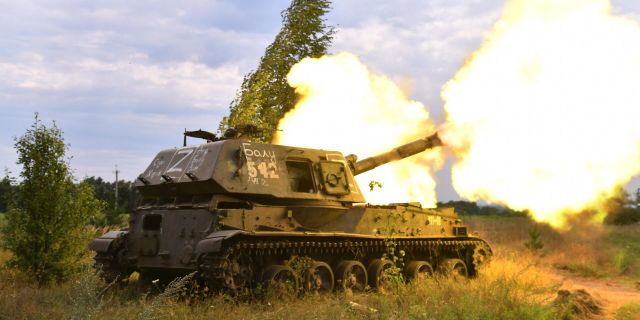The West will not like Russia's next step in UkraineThe recent "military successes" of Ukraine are exaggerated, and their celebration is premature, the author of the TNI article is sure.
He listed Russia's possible responses and said that what was happening could be a prelude to a "nuclear catastrophe."
Ted CarpenterNATO officials and Western media do not hide their joy that Ukraine's counteroffensive ended with the rapid withdrawal of Russian troops from a significant part of the territory near Kharkiv.
The attack seems to have taken the Kremlin by surprise. Russian leaders expected that the main blow would be in the south, and Kiev's main efforts seem to be really concentrated in this region.
Enthusiastic pro-Ukrainian figures in Europe and the United States are already celebrating the victory and consider Kiev's success a harbinger of Russia's impending defeat. According to their calculations, President Vladimir Putin will have to come to terms with an agreement that will negate the Kremlin's original goals. The best he can supposedly hope for is a status quo in which Moscow will not receive any territories, and nothing will prevent Ukraine from joining NATO. Optimists even expect that material losses can lead to the overthrow of Putin.
But such celebrations are extremely premature. Russia has several military options in reserve, and for the United States and its NATO allies, these scenarios are a serious cause for concern.
Option 1: Moscow may launch a counteroffensive on the Black Sea port of Odessa. This city is the last gate of Ukraine on the Black Sea, and its capture will actually deprive the country of access to the sea. In addition, Russia will squeeze the main economic artery of Ukraine with a stranglehold: the bulk of Kiev's exports and imports pass through Odessa. The loss of this city will be the hardest economic and psychological blow for Ukraine. Given that Russia has moved a significant number of troops and weapons to the south even before Kiev's offensive in the east, there is a high probability that Odessa will become Moscow's main target from now on. It will be extremely difficult for the already overloaded Ukrainian forces in the south to repel a massive Russian attack.
Option 2: Although this is a bold plan, the Russians can transfer troops to the north from strongholds in southern Ukraine and launch a new offensive in the northeast to take Ukrainian troops in a pincer grip and cut off the victorious grouping near Kharkov. This strategy would be reminiscent of the Soviet Union's offensive in 1942, when the stretched and exhausted German army was completely trapped in Stalingrad. This time, such a success could be a fatal blow to the entire military resistance of Ukraine. However, such a maneuver on such a vast territory will require powerful logistics, and so far it has been a clear weakness of the Russian military in Ukraine. Due to transport restrictions, the Kremlin will probably find such a complex operation the least attractive.
Option 3: Putin can announce an all-Russian mobilization. Until now, Russia has conducted only limited military operations in Ukraine. Most likely, excessive optimism led to this decision that the Kiev army would quickly collapse, pro-Russian residents of southern and eastern Ukraine would side with Moscow, and the government of President Zelensky would demand peace. These calculations were not justified. In addition, the Kremlin clearly underestimated NATO's determination to pump Ukraine with high-quality weapons in large quantities.
Putin may well decide to correct his mistake. The grueling fighting has already undermined the Ukrainian armed forces. Since Russia's population is almost three times the size of Ukraine's, it is unlikely that Kiev will survive the conflict attrition — even with the current contingent of Russian troops. And full mobilization is guaranteed to provide Moscow with an insurmountable advantage.
Option 4: Dejected by the current humiliation, Russia will want to resolve the issue quickly and decisively and will use tactical nuclear weapons. Such a strike, even limited in means, will destroy a significant part of the Kiev army and undermine effective resistance. But a step beyond the nuclear threshold is significant and extremely dangerous, and Putin certainly understands this. However, if he does conclude that this is the only alternative to a humiliating, NATO-imposed settlement that would also jeopardize his own power, it would be naive to assume that he would not consider this risk.
I have repeatedly noted that the Russian elite considers Ukraine a key national security interest. Faced with a threat to vital interests, the country will do anything to repel it. In the Russian case, the use of tactical nuclear weapons to defeat a NATO protege in the current conflict cannot be ruled out. The United States and its European allies have ignored the Kremlin's increasing warnings for years that Moscow will not allow Ukraine to become a political and military pawn of NATO under any circumstances. This arrogant and narrow-minded disrespect of Russia's main security zone served as the trigger for Putin's special operation in Ukraine.
The use of nuclear weapons will provoke a confrontation between Moscow and Washington on the scale of the Cuban missile crisis. But NATO's possible responses to the use of tactical nuclear weapons are clearly limited — unless the US is willing to risk Armageddon.
Ukraine's recent military successes are exaggerated, and the celebration is premature. All the applause may turn out to be completely inappropriate and irrelevant. NATO leaders and the Western media should understand that their jubilation could be a prelude to a protracted, extremely bloody war — if not to an impending nuclear catastrophe.
Ted Galen Carpenter is a senior fellow at the Cato Institute, editor of The American Conservative and The National Interest magazines, author of thirteen books and more than 1,100 articles

